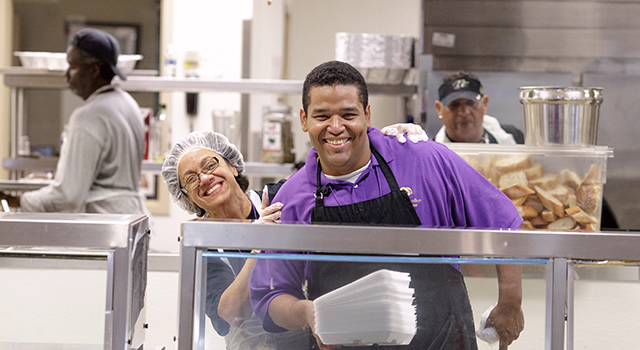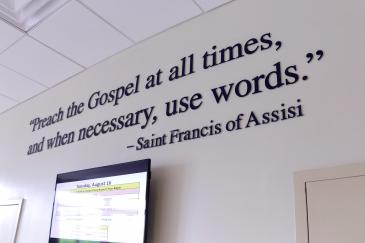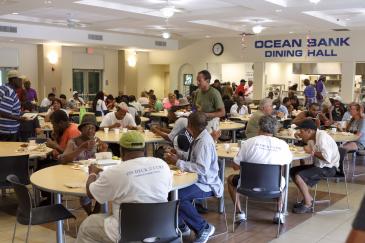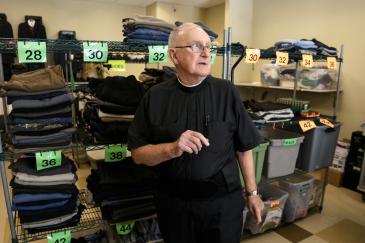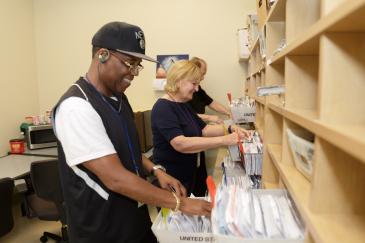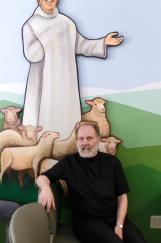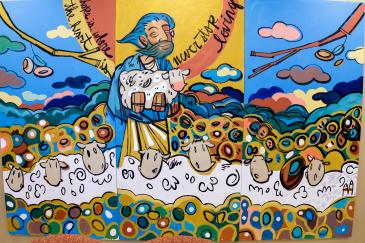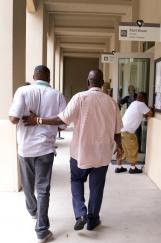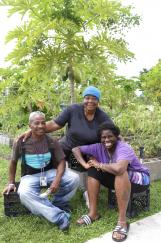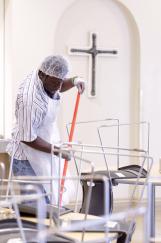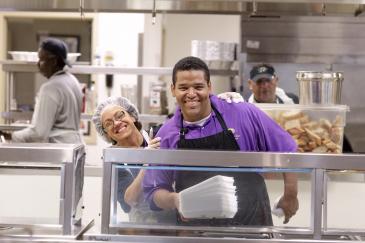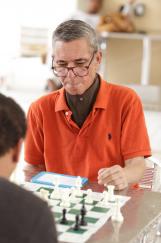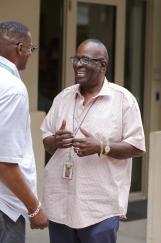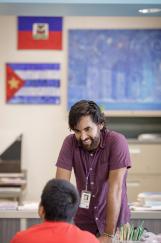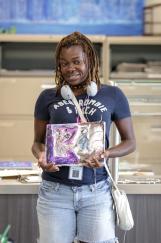By Tom Tracy - Florida Catholic
Photography: TOM TRACY | FC
- See related story: For some homeless a merciful alternative to jail
MIAMI | If there is a near perfect example of Pope Francis’ Year of Mercy in action, it might well be the work first begun here in the 1960s by the Little Brothers of the Good Shepherd.
The brothers initially came to Miami to assist in caring for the burgeoning waves of Cuban immigrants arriving in South Florida.
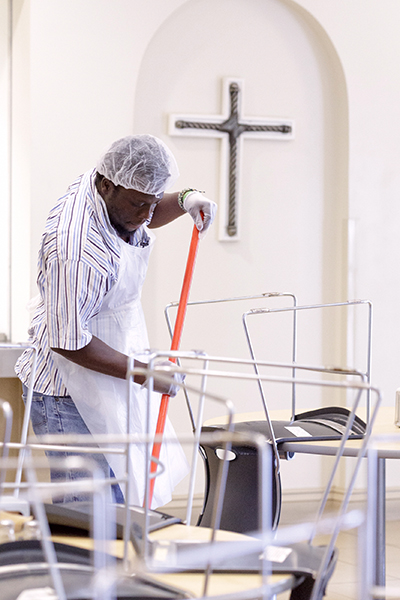
Photographer: TOM TRACY | FC
Camillus client Leo Stevens mops the dining room following a busy lunch period at what is now a full service center offering a system of care for persons who are poor and homeless.
But from their location in downtown Miami, they soon discovered that local poverty and homelessness in the adjacent neighborhoods, including Overtown, were more pressing.
Six decades later, Camillus House has grown from a small overnight shelter into a full service center, spread across a series of new buildings and offering a comprehensive system of care for the poor and homeless.
At the start of last year, the Little Brothers of the Good Shepherd fused with the Hospitaller Brothers of St. John of God. The merger of the two religious communities saw the disappearance of the Little Brothers as a formal entity. They are now part of the worldwide Hospitaller community.
Originating in Granada, Spain, the Hospitaller Brothers are one of the oldest religious orders in the Catholic Church, founded with the mission to provide assistance to the sick and needy.
“We members of the Brothers of the Good Shepherd had directed most of our attention to homeless, the homeless handicapped and the mentally ill, while the Brothers of St. John of God were mostly taking care of the mentally ill at psychiatric hospitals,” said Brother Raphael Mieszala, vice president of mission integration at Camillus.
Brother Raphael holds degrees in nursing and law and is actually an ordained priest, but like all the members of the community he goes simply by the title “brother.” When he assists in celebrating Mass and other duties at local parishes on the weekends, he takes on the title of “Father Raphael.”
Year of Mercy
Asked what the Year of Mercy means to him, Brother Raphael said they are not just clever words. To have any Christian meaning, they have to be applied.
“I consider what we are doing here to be mercy, and at the same time I recognize that it is not just the brothers who are practicing mercy, but also all of our co-workers, volunteers, the people helping us, and all the people praying for us,” he said.
At Camillus, Brother Raphael is one of four members of the religious community working in various capacities. He oversees the organization's pastoral care program, which, according to Camillus’ own literature, allows a person in need to reflect upon, vocalize or practice those values of spirituality that the person feels she or he needs to acquire, maintain or regain his or her own holistic well-being.
At a wall in Camillus House is a large mural of the Gospel parable of the lost sheep, an apt reminder of the mission of serving the homeless, of Jesus leaving the 99 to go after the one sheep that was lost. Brother Raphael said for Camillus House the parable means going after the one who is lost right here in Miami, the one on the street who is a so-called nobody, a throw-away person.
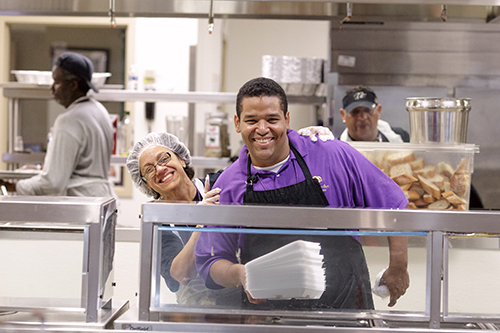
Photographer: TOM TRACY | FC
Eva Quesada, a Camillus House volunteer, and Carols Martinez, a member of the kitchen staff, share a laugh in the center's dining room.
“It makes me proud to be a Catholic — even if a lot of our volunteers are not Catholics. I am very happy for what our Church is doing for the poor, and that we are an arm of the Church,” Brother Raphael said. “We can preach louder with our actions than with our words.”
Miami and most major cities, according to Brother Raphael, will always have homeless populations. Some experts have estimated that Miami has three times the national average of mental illness.
“That is probably because of the good weather here: They would freeze up north,” he said. “In the old days, the homeless were often sent to the South. In my opinion we will always have street people.”
Community partnerships
Camillus House is able to do so much good in part because it enjoys extensive community partnerships and relations with Miami’s business, civic, educational, government, and nonprofit communities. On that score, Brother Raphael credited the recent leadership of Shed Boren, who has served as chief executive officer of Camillus since 2014.
“I am so glad that under Shed we are partnering even more than we had in the past, with our jail diversion/re-entry program for example — we cannot do that alone,” he said.
“The court system has a very hard time dealing with people who are mentally ill and in and out of jail, and that program is a beautiful example of how we can partner to give people care and the courts can work to keep them out of jail,” Brother Raphael said.
He added that Camillus House also has a strong pool of volunteers coming in from various places, including the local schools.
“We used to have volunteers coming in to do service time through court mandated service hours but now if we have volunteers here it is because they want to be here,” he said.
Brother Raphael noted that Camillus staff are assisting in education, prevention and monitoring of the Zika virus among Miami’s homeless: “We are passing out a lot of the mosquito repellant and it is new to this area, so we are just looking at the situation.”
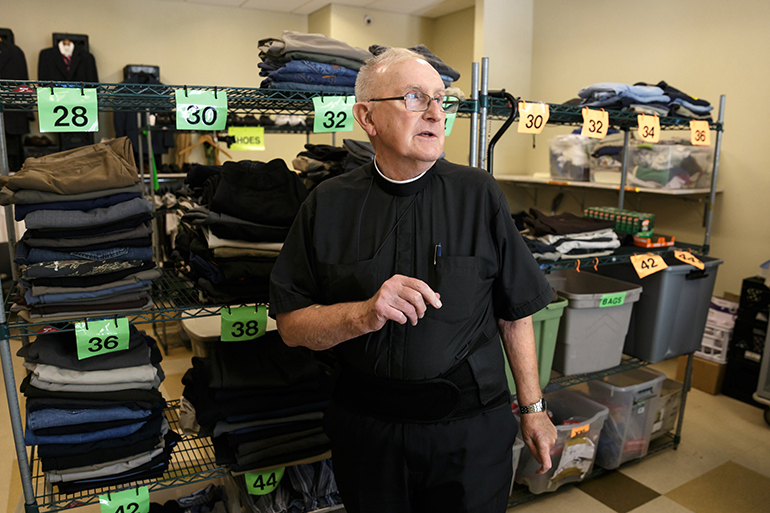
Photographer: TOM TRACY | FC
Hospitaller Brother William Osmanski, a direct care ministry provider, runs the clothing donation and distribution room at Miami's Camillus House.
